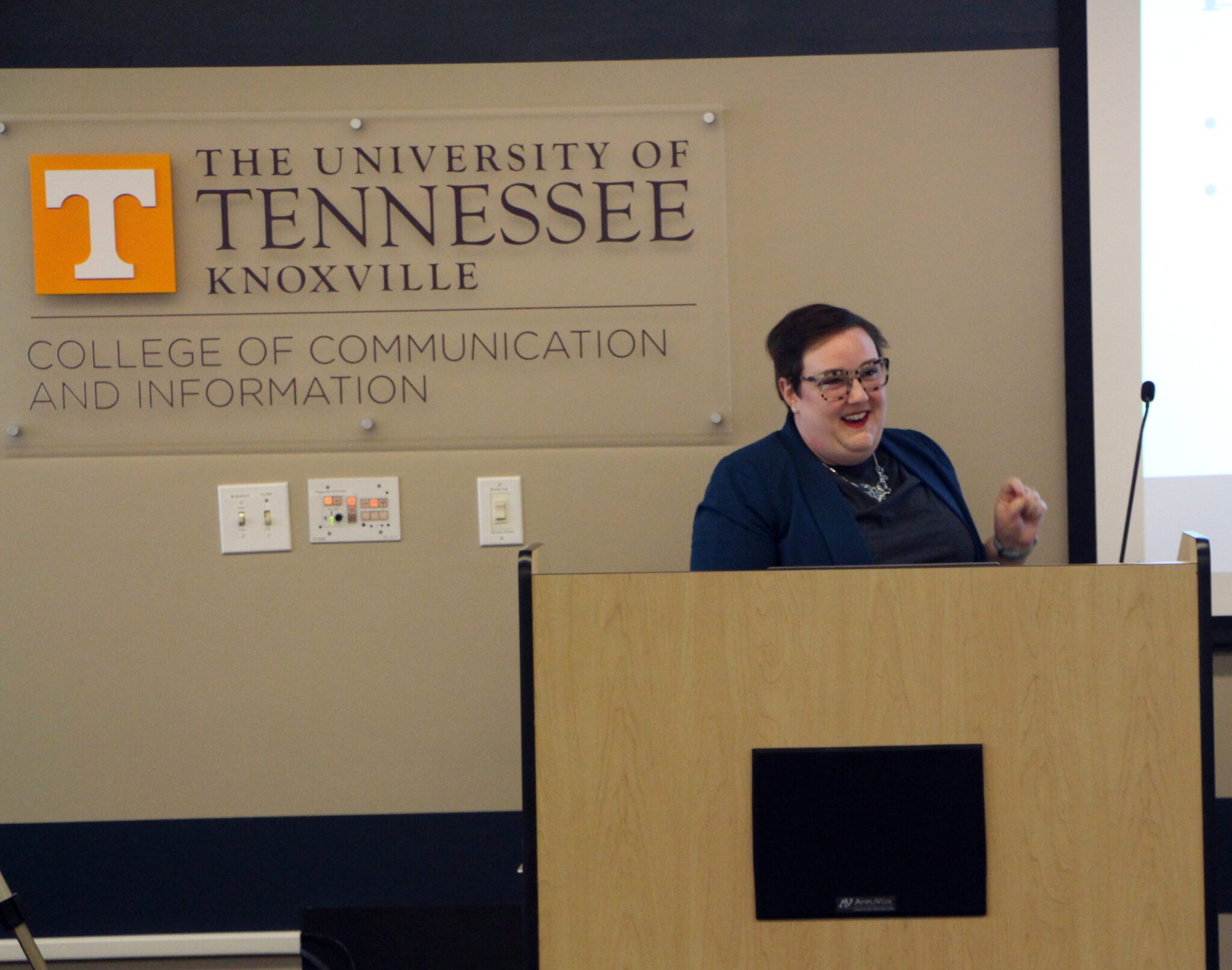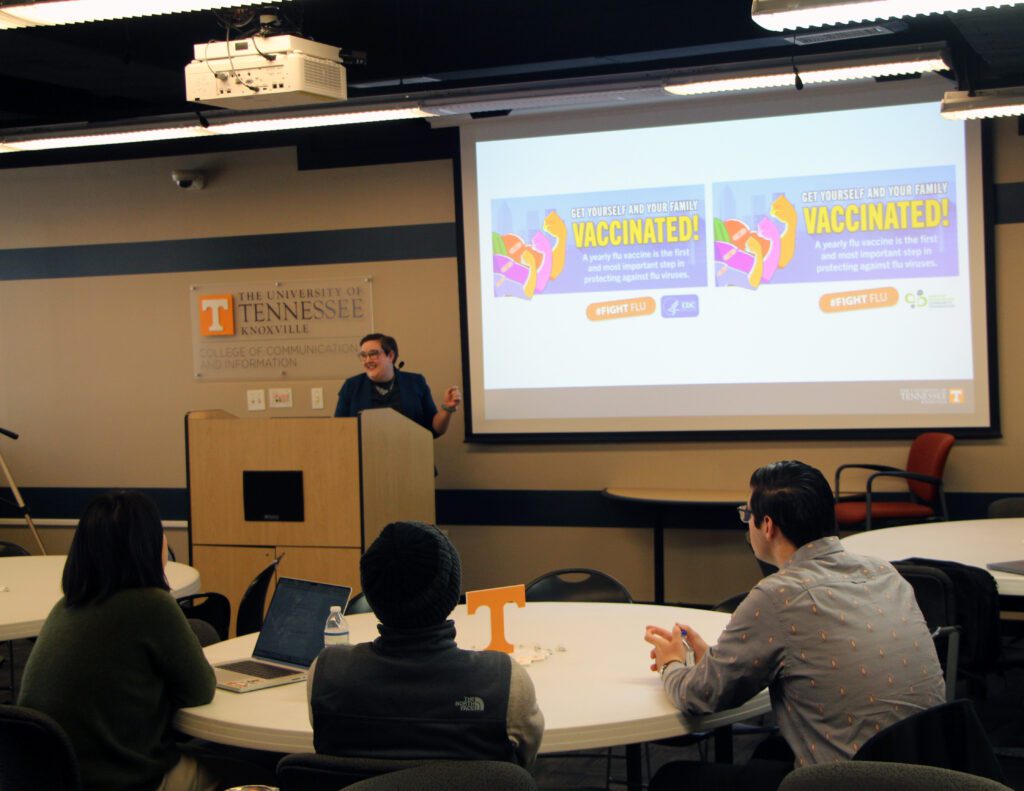Doctoral Student’s Research Seeks to Improve Health Information Messaging in Rural Communities

Doctoral student Kristin Schrader won first place for best doctoral student research presentation at the 46th Annual College of Communication and Information Research Symposium on Feb. 8.
While rates of colon cancer are pretty similar across rural and urban areas, research shows rural residents typically find the cancer at a much later stage.
This can lead to them experiencing higher rates of death and severe acute illness related to colon cancer. This occurs despite both rural and urban populations receiving similar messaging from public health agencies encouraging routine preventative screenings.
In an effort to understand this disparity and encourage more people to follow the recommended screenings for colon cancer and other conditions, doctoral student Kristen Schrader, who is pursuing her PhD with a concentration in journalism and media, is conducting research on how health information can be better tailored to rural communities.
“The Centers for Disease Control and Prevention and the United States Preventive Services Task Force recommend screening for those but we still see people who are not aware of their diabetes status or don’t find their colon cancer until it’s much too late,” Schrader said. “So, there’s still room to improve the rate of those screenings.”
Schrader’s research won first place for best doctoral student research presentation at the 46th Annual College of Communication and Information Research Symposium on Feb. 8. The annual symposium showcases the research and creative achievements of the college’s faculty, staff, alumni, and students at both the undergraduate and graduate levels.

Titled The Impact of Rurality on the Trust in Health Information Sources, Schrader presented a secondary analysis of data from the Health Information National Trends Survey (HINTS) to get a better understanding of what sources rural and urban populations trust more for their health information.
Julie Andsager, School of Journalism and Media professor and Schrader’s faculty advisor, was not surprised the research won at the CCI symposium. Schrader also won the top research award at the 2023 HINTS Data Users Conference.
“I was thrilled,” Andsager said. “I thought her presentation was well done.”
As part of her research, Schrader examined rural residents’ trust in health information shared from four main groups: doctors, friends and family, religious organizations, and government agencies.
One finding from her analysis is that trust in information from government agencies decreased with rurality. Another finding was that rural residents are also less trusting if the information comes from their doctor. Local religious organizations were deemed more trustworthy among rural residents.
Schrader said one challenge posed as part of her research was defining rurality. She said at the federal level there are around fifteen definitions for rural versus urban depending on the program and the agency administering it. In addition, there are different definitions in academia.
For her research, Schrader chose to use the Index of Relative Rurality developed by Purdue University researcher Brigitte Waldorf, which incorporates different metrics such as population density, built-up area, population size, and other factors in determining rurality.
Schrader hopes her research would ultimately benefit public health agencies in sharing their messages to rural areas with the goal of improving health outcomes in those communities. This could take the form of those agencies working more collaboratively with local community groups to help share health information.
Schrader said the COVID-19 pandemic provided inspiration for her research when she observed a disparity in vaccination rates in urban versus rural areas, despite everyone receiving similar messages. For her research, instead of vaccinations she is focusing on different conditions such as colon cancer, pre-diabetes, and hypertension.
Schrader has an extensive background working with the CDC and NIH on different health care research ideas. She started the doctoral program at the University of Tennessee, Knoxville, to increase her knowledge in healthcare data and research to help more people. She currently works full-time as a senior study director for Westat as she pursues her doctorate.
In addition, Schrader and Andsager both are interested in research impacting rural communities. Andsager said she grew up in a rural area and has always been interested in rural health. She said it’s a really important topic to study because there can be such huge health disparities between rural and urban populations.
Schrader currently lives in a rural area after years in a large city. As someone who lived in both, she said understanding the differences between rural and urban communities piqued her interest as a researcher and she hopes her efforts could eventually lead to better health outcomes in communities like hers.
Andsager said the next step in Schrader’s research is to design an experiment that pairs the same messages with different sources and observing how people respond.
To learn more about Schrader’s and other research from the annual CCI Research Symposium visit ric.utk.edu/research-symposium/.